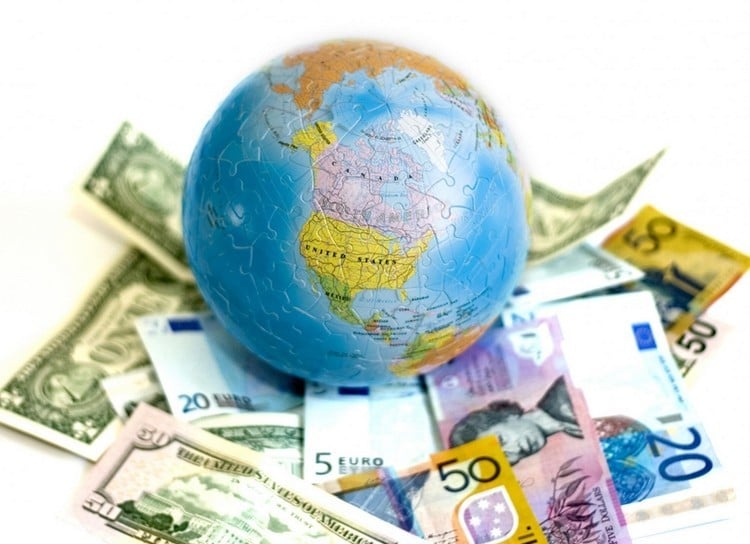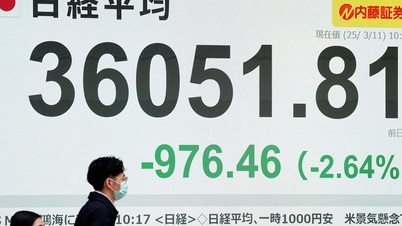 |
| High inflation, rising interest rates and sluggish growth remain major challenges for the world economy. (Source: Visual Capitalist) |
The trouble is not over yet.
On May 31 (local time), the US House of Representatives passed a bill to suspend the borrowing limit for 2 years. The bill was passed just days before the possibility of the US defaulting on its debt for the first time. Thus, the US and the world can avoid an imminent crisis. However, a series of problems such as high inflation, rising interest rates and slow growth have not disappeared.
"Even without taking into account the worst-case scenario, we are still looking at a global recession scenario," said Carsten Brzeski, head of global macro research at Dutch bank ING.
There is evidence that economic growth is slowing in the United States and China - the world's two largest economies.
The US economy grew much lower than expected in the first quarter of 2023.
Meanwhile, the latest data showed that factory activity in China in May 2023 fell to its weakest level since the country ended its "Zero Covid" policy five months ago.
As such, China's economic recovery is losing momentum, hampered by weak domestic demand, rising unemployment and a deep slump in the property sector.
This affects Germany because China is its most important trading partner. Germany falls into recession when its economic growth is negative for two consecutive quarters (Q4/2022 and Q1/2023) as last year's energy price shock affects consumer spending.
Germany is Europe's biggest producer, exporter and consumer, so a prolonged slowdown in Europe's largest economy would spell trouble for the rest of the region, which has only narrowly avoided recession since the start of the year.
In addition, momentum in France, which has seen a strong economic recovery since the Covid-19 pandemic, is also slowing, with official data showing that consumer spending in the country fell for the third consecutive month in April 2023.
Inflation is too high
Inflation has eased in France in recent times - as has the decline in Germany, Spain and Italy.
Eurozone inflation fell more than expected in May 2023 as core price increases slowed, data showed on June 1. Inflation in the 20 countries that share the euro fell to 6.1% in May 2023, down from 7% in April 2023 and below the 6.3% forecast by economists polled by Reuters .
Inflation has also been brought under control in the UK and US – at 8.7% and 4.9% respectively – but it remains uncomfortably high for central banks, which aim to keep inflation at 2%.
Many investors expect central banks to raise interest rates further in the coming weeks to tame rising prices, but both are acting as drags on the economy.
Inflation increases the cost of everyday goods and services, reducing consumer spending. At the same time, rising interest rates make loans and mortgages more expensive, putting pressure on spending by businesses and households.
 |
| Inflation has yet to cool in many countries. (Source: Getty Images) |
The impact of higher borrowing costs has yet to be fully felt by many.
A wave of defaults among U.S. and European companies is “imminent” due to the tightest monetary policy in 15 years, combined with high debt levels and low profitability, Deutsche Bank said. The wave could last until the end of 2024, Deutsche analysts said.
Capital Economics' analysis also shows that, so far, less than half the impact of monetary policy tightening in developed markets has been felt in the real economy.
“As financial conditions tighten, we expect most major advanced economies to fall into recession and experience wage pressures,” said Neil Shearing, chief economist at Capital Economics. “The recessions we forecast are relatively mild and should probably be considered ‘soft landings’ given the high inflation over the past year.”
Two long-term threats
Any recession, however mild, would be worse for the world economy. Recessions could be triggered by inflation in many countries and could arise from two long-term threats: the military campaign in Ukraine and the climate crisis, which would pose risks to global supply chains and food prices.
Neither Russia nor Ukraine has signaled an end to their conflict, which has lasted more than a year. Last year, the military campaign sent global food prices to an all-time high. Although prices have since fallen, they remain high in many countries, causing famine in poor nations.
In addition, the climate crisis threatens many European countries. For example, devastating floods in northern Italy last month submerged thousands of farms in one part of the country. The once-in-a-century disaster followed years of severe drought in the region, which compacted the soil and reduced its ability to absorb rainfall.
Another severe drought in southern Europe could also make matters worse. “Spain’s dry soils and severe drought are affecting a wide range of crops and threatening to push up food prices in many EU countries,” said agricultural data firm Gro Intelligence.
Source


![[Photo] More than 17,000 candidates participate in the 2025 SPT Competency Assessment Test of Hanoi National University of Education](https://vphoto.vietnam.vn/thumb/1200x675/vietnam/resource/IMAGE/2025/5/17/e538d9a1636c407cbb211b314e6303fd)

![[Photo] Prime Minister Pham Minh Chinh chairs meeting on science and technology development](https://vphoto.vietnam.vn/thumb/1200x675/vietnam/resource/IMAGE/2025/5/17/ae80dd74c384439789b12013c738a045)
![[Photo] National conference to disseminate and implement Resolution No. 66-NQ/TW and Resolution No. 68-NQ/TW of the Politburo](https://vphoto.vietnam.vn/thumb/1200x675/vietnam/resource/IMAGE/2025/5/18/adf666b9303a4213998b395b05234b6a)





























![[Photo] Readers line up to visit the photo exhibition and receive a special publication commemorating the 135th birthday of President Ho Chi Minh at Nhan Dan Newspaper](https://vphoto.vietnam.vn/thumb/1200x675/vietnam/resource/IMAGE/2025/5/17/85b3197fc6bd43e6a9ee4db15101005b)





































































Comment (0)